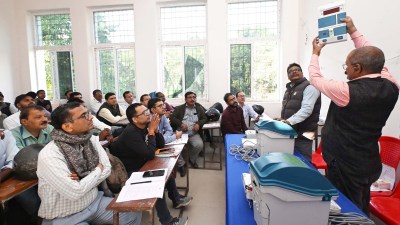Truth casualty in dargah war: rival groups blame each other for absent CCTVs, even blast
One blast has blown the lid off a protracted war between groups fighting to take control of the holy shrine of Khwaja Moinuddin Chishti...

One blast has blown the lid off a protracted war between groups fighting to take control of the holy shrine of Khwaja Moinuddin Chishti — mainly its finances — and truth looks like the first casualty. These groups are blaming each other for the blast and even on a crucial issue like security, there are allegations and counter-allegations.
For one, no one is able to say for sure how many CCTV cameras were installed at the dargah. While the Khadims, the traditional volunteers who number about 5000 families and who are considered the foot-soldiers of the dargah, say there were 14. The Dargah Nazim, appointed by the Central Government to look into the shrine’s management, says there were 16 and the police say there were 17.
How many of them were working? The answers vary again.
•Says Ahmed Raza, Dargah Nazim: “All the CCTVs were in operation and we checked all on Thursday morning. We also repaired a few which were not functioning then. However, recording of what is caught by the camera is not our job. The CID has been given a room where they can do this and I cannot say if they were recording the images or not.”
•Ajmer Collector Naveen Mahajan says that he “believed” cameras were functional and images were recorded. “I don’t have the details since the Nazim is responsible for them.”
•Says Additional Director General of Police (Crime) A K Jain: “Few cameras were working but there is no facility of recording.”
•Haji Syed Gulam Kibria, president of the Khadim organisation, has a different take: “CCTV cameras were removed but I won’t be able to say for sure how many. I was told they were faulty and needed repairs.”
When asked to comment on reports that a mob ransacked the CCTV control room, Mahajan said: “The police recovered some tapes and are now trying to figure out if the control room was damaged deliberately.”
But ADGP Jain says: “No recording was being done, so there is no question of tapes. There is nothing to suggest that the room was attacked deliberately and with the intention of destroying some vital evidence…The blast was an act of terror and people from outside are involved.”
Jain has a reason to say this. For, Zenaul Abedin, the Dargah Diwan — a self-appointed title (effectively an event manager) that dates back almost a hundred years but has no official administrative legitimacy — has accused the Khadims, the traditional volunteers who number about 5000 families, of being behind the bomb blast.
“The Khadims are responsible and they were targeting me. The bomb was planted at the spot where I hold my weekly gatherings on Thursday evenings and they meant to kill me,” he claims.
Outrageous, say Khadims, accusing him of being responsible — if not in action, at least in thought. “He was the one who had said at one time that he would blow up the dargah. That might have been years ago but it’s a thought that came to his mind not ours,” says Kibria, president of the local Khadim organisation.
According to the Khadims, Abedin’s role as a Diwan is limited to organising qawwali programmes at the holy shrine every Thursday and during the annual Urs, for which he is paid. Much to their dislike, Abedin has been demanding a share of the dargah’s earnings.
Late last night, hours after the blast, the dispute turned ugly. Abedin was attacked by a group of Khadims at the dargah when he started lashing out at the Khadims holding them responsible for the bomb blast. “I wanted enough security measures at the dargah but the Khadims resisted. Many of them have connections with the underworld.” Denying these allegations, Kibria said Abedin wanted “cheap publicity.”
The government’s response: “They are forever fighting and we need to concentrate on the investigations rather than their infighting.”
The fight between the Khadims, the Diwan and the Government-appointed nominees is at the heart of the mismanagement at the dargah. Prompted by a PIL in the Delhi High Court and countless complaints, the report of an inquiry panel under the Ministry of Minority Affairs, resulted in an overhaul of the dargah’s management a few weeks ago.
The seven-member panel — Ghayur-e-Alam in the chair and Firoz Bakht Ahmed as convenor — indicted those managing the dargah at the time. A report submitted by Bakht found instances of “misconduct of authority, irregularities, misappropriation of funds, illegal constructions, encroachments and mismanagement of the affairs by the dargah committee members.”
It made 30 key recommendations and accused the members of the dargah committee in the strongest terms calling them “inactive, unconcerned, erratic, numb and prejudicial”. Another report submitted by a panel member M R Haq called for “preferably a new Act providing a better scheme of management of dargah” and “continuous monitoring.”



- 01
- 02
- 03
- 04
- 05



























